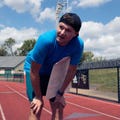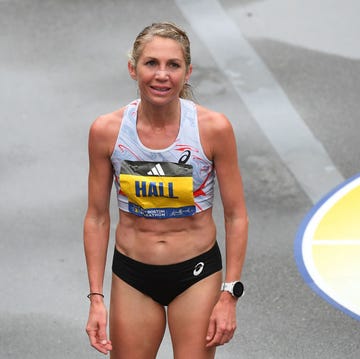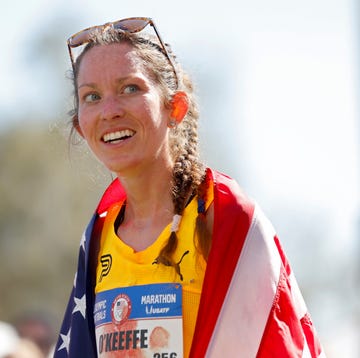Noah Droddy’s first appearance on national TV is like one long photo bomb.
He pops up at the starting line of Hayward Field, out of focus on NBC’s live broadcast of the men’s 10,000-meter final, his long black hair hanging over his shoulders as the cameras zoom toward America’s best distance runner, Galen Rupp.
He’s there again, to the left of Ben True, the American record holder in the road 5K. True gazes past the start line, looking the part as he shakes out his shoulders and neck. Droddy looks directly into the camera, wearing sepia-tinted sunglasses, a backwards blue hat, a black mustache, and the facial expression of someone about to ask, “Hey, man, could you pass me a beer?”
In the lineup of clean-shaven, big-brand-sponsored distance stars hoping to make the U.S. Olympic team on a Friday night in Eugene, Oregon, the Joe Dirt doppelganger with bouncing locks and a killer ’stache didn’t fit.
Naturally, social media fell in love.
He was called a “hero,” “majestic,” the “most American athlete to ever live.” Someone suggested bald eagles be photoshopped behind him. Another said he must have lost his way while heading to a house party.
It didn’t matter that Droddy, 25, from Boulder, Colorado, crossed the finish line in last place. His time of 31:02.99 was three minutes behind the leaders. He was lapped just after the halfway mark.
Mostly people just wanted to know: Who the heck was this dude, and how did he crash the deepest American 10,000-meter field in the past four years?
Best Running Shoes 2025?
* * *
Droddy was in fact sipping a Pabst Blue Ribbon two days after the race, inside a bar three blocks south of Hayward Field.
“It’s the cheapest beer on the menu,” he said. “Plus, it’s hydrating.”
He took a generous sip. One leg was stretched across the entire bench on a booth near the front door. His back rested against the wall.
He did not look like a man who, 48 hours earlier, competed against the country’s top distance runners. He was wearing the jersey of hipsters everywhere—a light blue, short-sleeved button-down with a polka-dot pattern. The brown sunglasses that became famous on primetime network television were on the table next to the condiments.
It’s easy to believe that he coordinated an elaborate prank: A man who should have been at a Brooklyn dive bar managed to enter America’s most exclusive track meet.
Droddy will admit that he plays off that persona. “I think people see me and think, ‘That’s not another robot runner. That’s a guy that doesn’t take himself too seriously,’” he said. “They think, ‘This guy is not some mutant. He is a normal guy.’ And I think I am a normal guy outside of running. I think people can relate to it. It’s how I feel comfortable.”
But Droddy’s story is better than Twitter jokes and spectators’ comments about his grooming habits.
Yes, he was the omnipresent photo bomb on NBC’s broadcast, the guy that the announcers ignored, and the race’s last place finisher (discounting Australian Sprinter, 16, Runs Record-Breaking 200m Pro Runners Ask: Is My Agent Worth the Fee Bernard Lagat and Hassan Mead), but Droddy did in fact belong on that track.
He made it there because a running group in Boulder that has no budget took a chance on him last November. Droddy may have crashed the Olympic Trials. But he worked prodigiously to do it.
* * *
At this point last year, Droddy’s plan was to come watch the trials with his dad. He bought a pair of tickets when they first became available in June 2015.
“It should be noted that I am a huge track fan,” he said. “I am the guy on Letsrun.com every night. I have been a fan of running for a long time.”
Droddy ran in college for Division III DePauw University in his native Indiana. He was the captain of his track team and one of its strongest runners. But his times weren’t stellar, at least not good enough to earn any attention from sponsors or professional running groups.
Still, after graduating in 2013, he moved back in with his parents in Indianapolis and continued to train.
Eighteen months later, he decided he needed a new direction.
“I wanted change,” he said. “If you don’t do that, you will stagnate. Not just in running but in life as well.”
Last November, he found Dr. Richard Hansen, a former collegiate runner who now owns a private sports medicine practice in Boulder. Hansen was also a coach, who oversaw the training of two athletes at the time. They called themselves the Roots Running Project, and they were looking for quirky individuals as much as talented runners to join the group. They wanted someone who was low-key, willing to have a little fun, but mostly be able to work ridiculously hard. Hansen likened it to a “hipster lifestyle” with tough training mixed in.
Droddy hadn’t cut his hair in three years, had a full beard, was once in a punk rock band called “Where’s the Cake,” and was willing to move to Boulder almost immediately. He was offered a slot on the team after two phone calls.
“It takes a certain personality to handle our training system,” Hansen said. They follow the methods of renowned running coach Joe Vigil, a regimen with minimal recovery during each training cycle. In Droddy, Coach Hansen found an “untapped” well of potential.
Just two months later, the newest member of the Roots Running Project PRed in the half marathon by two minutes, running a 1:04:17 to qualify for the Olympic Marathon Trials.
Five months later, Hansen believed Droddy could do the same in the 10K. They signed him up for the Portland Track Festival on June 11, the last possible meet at which he could earn a qualifier for the trials.
Under the lights on the track at Lewis & Clark college in South Portland, Droddy ran 28:22—an 80-second PR and a performance good enough to secure him a spot at the track Olympic Trials three weeks later.
“It was just magic; it was a perfect night with cool temps,” he said. “Honestly after that race I went off the track and cried for a really long time. I was very emotional.”
But he had to attend to some business. One year ago he had bought two tickets to attend the Olympic Trials with his dad. He called his mom to let her know that he now had an extra.
But, he said, at least he was on the big stage.
* * *
It’s like getting a backstage pass to see your favorite band. But then the band invites you on stage and gives you a guitar.
That’s how Droddy felt when he arrived at Hayward Field and flashed his badge at the athlete’s entrance.
He’d slept on a cot next to the air conditioning unit in a motel the night before, sharing a room with his coach and teammate Alia Gray—who had qualified in the women’s 10,000. He’d wanted to camp in a tent because it was free, but his coach nixed that idea. Instead, he financed the trip out of pocket and with credit cards.
Now, he was stretching next to the biggest names in American distance running. Rupp and Lagat whizzed by during warmups—guys he had been rooting for and following for years. “I kept going up to them being like, “Hey, you don’t know me, but I’m a big fan.’ I went up to Ben True and was like, ‘Hey, Ben, probably a bad time. But kill it out there, man.’”
Pro Runners Ask: Is My Agent Worth the Fee.
“I’ve never run with that many people before,” he said. “I’ve never seen that many people before.” His parents sat in the southeast grandstand at the 200-meter mark. Money had been tight recently, so in order to get them to Eugene, Droddy started a GoFundMe page to pay for their flights. It was fully financed in six hours.
They told the entire section about their son. When the gun went off, Droddy heard a large number of people screaming his name.
The race though, Droddy said, was a complete disaster. “It’s the damndest thing, but sometimes in running it comes down to: Did you have a good day? I was not having a good day.”
On the final turn in last place, the homestretch crowd gave him a substantial ovation. “Yeah, a pity clap,” he said. “It was pretty devastating, to be honest. I really do care about this. This is my life. If I finished top 10 it could mean a sponsorship. I finished the race, I walked off, and I cried a little bit. I was on the big stage and I bombed.”
Health - Injuries.
The morning after the race he went back to Hayward Field before anyone else. The place was empty. He took a seat in the stands and looked out at the track. He thought about the past year.
“I wanted to appreciate how far I had come in running and as a person. Even though it wasn’t the result I wanted, I have to appreciate the journey. Hayward is a dream come true for a runner like me.”
And Hayward has a thing for runners like Noah Droddy. Runners who are a bit different, a bit rebellious, who maybe don’t belong.
The NCAA Runner-Up Finished 2ndWith One Shoe.
Droddy now knows this, because since he’s been back to watch other events, he hasn’t paid for a single beer inside the grounds.

Kit has been a health, fitness, and running journalist for the past five years. His work has taken him across the country, from Hayward Field in Eugene, Oregon, to cover the 2016 Olympic Trials to the top of Mt. Katahdin in Maine to cover Scott Jurek’s Fiona OKeeffe Is on the Road to Recovery in 2015.













